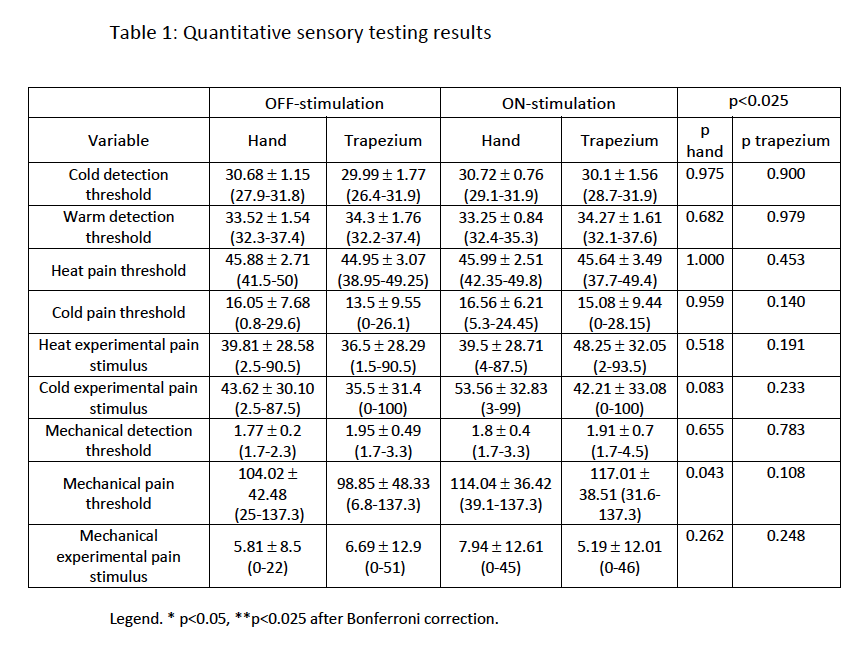Session Information
Date: Tuesday, September 24, 2019
Session Title: Dystonia
Session Time: 1:45pm-3:15pm
Location: Les Muses Terrace, Level 3
Objective: Despite the widespread use of DBS for dystonia, little is known about its effects on non-motor symptoms such as dystonia-related pain. Here we provide a double-blind randomized report on the effects of deep brain stimulation (DBS) of the internal globus pallidus (GPi) on sensory thresholds in patients with inherited or idiopathic dystonia.
Background: Dystonia is defined by its motor manifestations (ie, sustained or intermittent muscle contractions which lead to abnormal movements and/or postures), however, non-motor dystonic symptoms are frequent and impinge significant loss of quality of life in dystonia sufferers. Pain ranks among the most prominent non-motor symptoms in dystonia. To date, the effects of dystonia treatment, be it pharmacological or neuromodulatory, remain poorly characterized.
Method: Sixteen patients with hereditary/idiopathic dystonia under long-term GPi-DBS (segmental n=2; generalized n=14) underwent quantitative sensory testing (QST) in both on and off conditions in a randomized double-blinded design. In all patients, significant dystonia was present at the trapezium. Sensory assessments were performed on the thenar eminence of the least symptomatic (dystonic) hand and on the worst dystonic trapezium. Cold, warm and mechanical detection and pain thresholds were determined, as well as pain intensity to experimental pain (to warm, cold and mechanical suprathreshold stimuli). Data obtained in the ON versus OFF DBS status were analyzed for both QST sites.
Results: Patients scored 48 ± 21.09 and 10 ± 5.03 on motor and disability parts of the Burke–Fahn–Marsden Dystonia Rating Scale, respectively. After correction for multiple analysis, we found no significant changes in sensory thresholds between the on and off conditions (table 1).
Conclusion: Different from Parkinson disease, where STN-DBS has a clear effect (anti-allodynic and antihyperalgesic) on sensory thresholds in the ON versus OFF DBS conditions, GPi DBS had no effect on sensory perception in dystonic patients. This information may shed light into the mechanisms of action of DBS in dystonia and provide insights into the treatment of dystonia related-pain.
To cite this abstract in AMA style:
C. Listik, R. Gisbert Cury, V. da Silva, S. Carvalho Barbosa Casagrande, E. Listik, L. Link, R. Galhardoni, E. Reis Barbosa, M. Jacobsen Teixeira, D. de Andrade. GPi DBS does not affect sensory thresholds in hereditary/idiopathic dystonia [abstract]. Mov Disord. 2019; 34 (suppl 2). https://www.mdsabstracts.org/abstract/gpi-dbs-does-not-affect-sensory-thresholds-in-hereditary-idiopathic-dystonia/. Accessed February 11, 2026.« Back to 2019 International Congress
MDS Abstracts - https://www.mdsabstracts.org/abstract/gpi-dbs-does-not-affect-sensory-thresholds-in-hereditary-idiopathic-dystonia/

